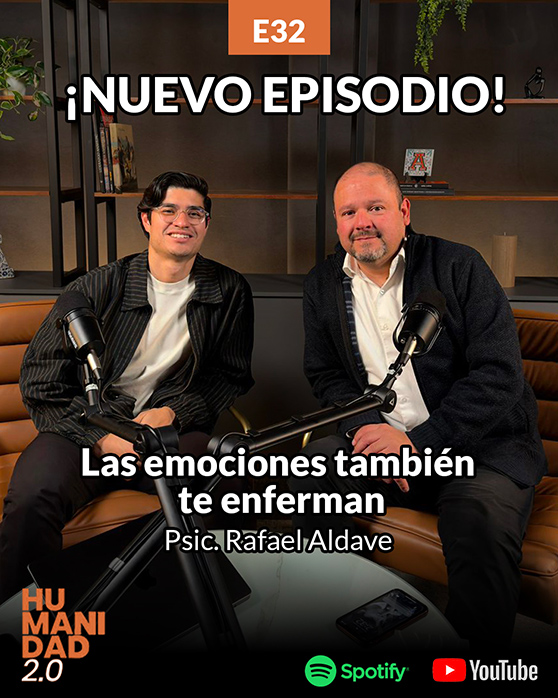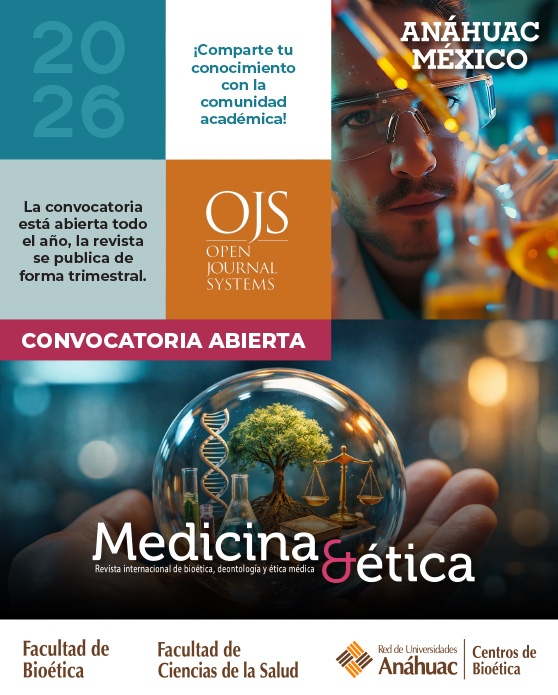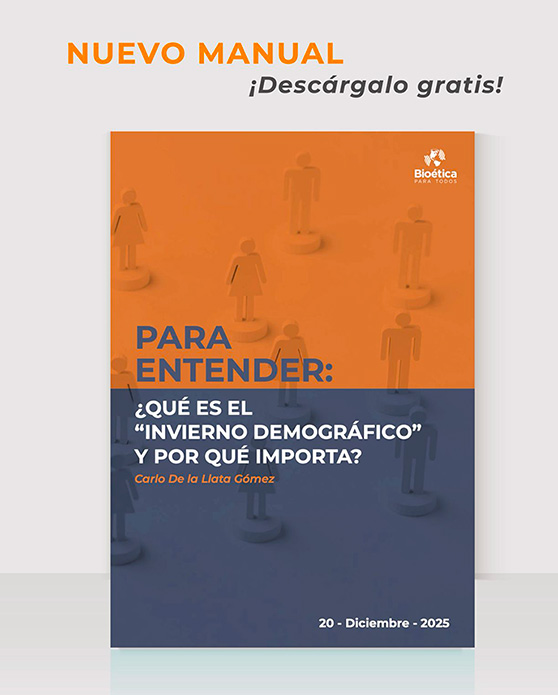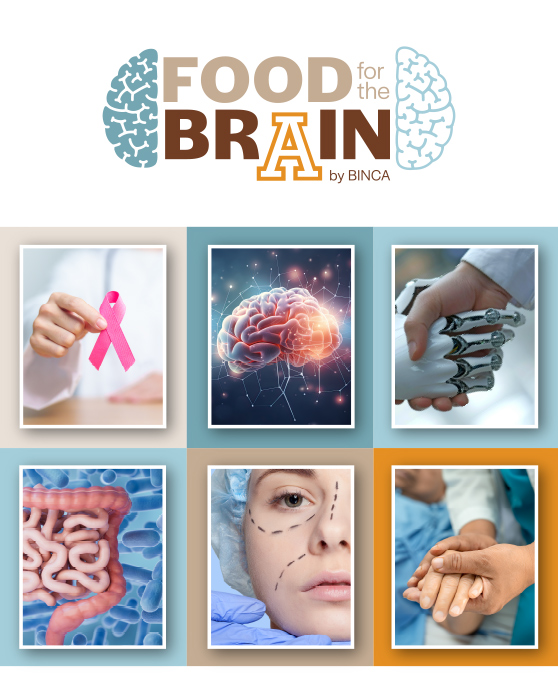
November 24, 2025
Authors: Víctor Hugo Cabrera Espinosa and Juan Manuel Palomares Cantero
Versión en español
Can a science that heals forget why it heals? Amid the whirlwind of protocols, indicators, and costs, the health sciences risk losing their soul. From the standpoint of open reason, it becomes urgent to reconcile the good—the moral orientation of action—and meaning—the source of its fullness—within a truly humanizing practice.
Doing Good in an Age of Efficiency
What does it mean to do good when health has become a territory of calculation, protocols, and profitability? Robert Spaemann1 warned that the good is not what we desire because we desire it, but what we ought to desire because it is good in itself. That statement, simple yet unsettling, strikes at the heart of a medicine that, under the promise of efficacy, risks forgetting its highest purpose: to care for persons, not merely to cure bodies2. The technique can save, but it can also mislead when the criterion of the good is mistaken for what is merely possible.
Aristotle, in Nicomachean Ethics, understood the good as that toward which all things aim, and that human action reaches its fulfillment when it leads to the flourishing of the one who acts3. Phronesis—practical wisdom—does not consist in calculating means, but in deliberating about true ends. Thomas Aquinas later deepened this vision by distinguishing between useful or pleasurable goods and the bonum honestum, the good that perfects the person because it participates in the rational order of being4. Long before both, Augustine of Hippo had already affirmed that the good is founded on ordered love: only when love is directed toward the Supreme Good does human action acquire moral truth5.
From this tradition, bioethics understands the good in health not as an outcome or a statistic, but as the unconditional respect for the dignity of every human life6. Edmund Pellegrino reminded us that the physician acts rightly when they place the good of the patient above all other considerations, institutional or economic. When medicine is governed only by efficiency, the patient becomes a means rather than an end; where the good prevails, care becomes a moral act.
In daily practice, health professionals face a hierarchy of goods that tempt them to confuse priorities: technical efficiency, institutional obedience, or economic sustainability. All have their place, but none can replace the personal and common good. Health ethics is not measured by procedural correctness but by moral orientation—whether the act leads to human flourishing7. Choosing the good in an environment that measures everything by its utility is an act of inner freedom, a form of ethical resistance, and above all, a living hope in the dignity of the other8.
Meaning When Technique Falls Short
What sustains the professional when illness does not relent, when treatment fails, when technique is no longer enough? Viktor Frankl answered that “those who have a why can bear almost any how.” That why—that core of meaning—is what gives medicine its moral depth9. Meaning cannot be prescribed or taught through manuals; it emerges in the relationship between the one who accompanies and the one who is accompanied. At the heart of the clinical act, an encounter occurs between two wounded freedoms that, by recognizing one another, humanize each other.
In bioethics, meaning is more than emotional consolation: it is a form of practical truth10. Paul Ricoeur reminded us that to heal is also to narrate, because the patient needs to integrate pain into a story that transcends the body11,12. In this line, Emmanuel Levinas affirmed that meaning arises from the face of the other—from that gaze that calls me to responsibility even before I formulate any diagnosis13. To care is, above all, to respond. Gabriel Marcel added that suffering can only be faced through hope, that fidelity to being that does not surrender before the absurd14. And Martin Buber would complete the thought: true care is born from encounter, when the professional ceases to see a “patient” and discovers a “you”15.
Meaning, therefore, is the capacity to give reasons for why I do what I do or decide what I decide, it is, at first, the purpose that moves me toward an end; the more ultimate that end, the more transcendent it becomes. Thus, every reflection, decision, or action in medicine must ultimately be guided by love of neighbor, fulfilling the vocation of service to which one is called.
Professional meaning lies in caring for the patient’s health; yet the deeper transcendent meaning is to preserve human life, which always implies a personal who: not what I do, but for whom I do it. The ultimate end of meaning is always a person. This perspective opens the way to compassion, the recognition of the other’s dignity and humanity, and expands the horizon not only of reason but also of the heart.
When health practice is emptied of this dimension, the hospital becomes a factory, and the professional an operator. Soulless technification produces what Hans Jonas called “the amorality of knowledge without conscience”: a power that no longer knows why it does what it does16. In contrast, Edmund Pellegrino reminded us that the clinical relationship is a moral community, in which the professional grows in humanity by seeking the good and meaning of the other17. To care with meaning is not a secondary task: it is the highest form of knowledge. Only those who serve life in its mystery understand that even in fragility, fullness remains possible.
When Everything Can Be Measured but Nothing Has Value
What remains of medicine when everything can be measured but nothing seems to have value? The greatest risk of our time is not ignorance but the loss of wonder. When health becomes a land of statistics, the good becomes what is permitted, and the true becomes what is useful. Reducing the good to consensus is the most elegant form of ethical cowardice: rightness is defined by majority, not by truth. Reducing it to efficiency is even more dangerous, because it turns the patient into a variable, the professional into a technician, and human pain into an inconvenient data point. Under this illusion of control, suffering is seen as a system error, and conscience as an interference to be silenced18.
On the other hand, meaning suffers its own mutilation. When it is limited to the body or to pleasure, it is stripped of its spiritual depth. Health, then, ceases to be an experience of wholeness and is degraded to mere biological performance. This reduction—so celebrated by health indicators and policies—forgets that human life seeks not only to endure, but to have meaning. Human beings are not content with simply existing: they need meaning to exist. And this yearning is the only thing that saves them from becoming mere experiments or commodities.
Healthcare professionals cannot accept the closure of their own knowledge. When "I know" and "I can" replace "I must," reason becomes its own prisoner. Hans Jonas warned that the fragmentation of knowledge is not a technical problem, but an ethical wound19. Where the dialogue between science, conscience, and spirit breaks down, medicine becomes a desert.
Faced with this drift, Benedict XVI proposed open reason: an intelligence that is not satisfied with mere data, because data neither thinks nor consoles20. Bioethics today has the task of embodying this openness, asking not only how the body functions, but also for what purpose and for whom healing is sought21. Recovering the wisdom root of medicine—that alliance between reason, conscience, and compassion—is not nostalgia, it is resistance. Because science that forgets the good loses its meaning, and science that forgets meaning ends up losing humanity.
Open the reason to heal the gaze
Open reason is not an intellectual luxury or a spiritual slogan; it is a moral imperative. It implies recognizing that knowledge is not enough, that every science that touches human life must also question its meaning. Benedict XVI described it as an intelligence that does not renounce truth but rather expands it: a reason that integrates evidence and conscience, the precision of data and the depth of mystery22. In the healthcare field, this openness is a form of conversion of thought: the shift from technique to care, from calculation to discernment.
The professional who thinks with open reason knows that every clinical decision is an ethical act before it is a technical one. Prudence, far from being timidity, is the lucidity of one who deliberates on true ends23. Compassion, which does not replace competence, humanizes it: seeing the patient as a person and not as a file is the beginning of all ethics. Justice, then, ceases to be an abstraction and becomes a concrete distribution of dignity, and hope teaches that accompanying has value even when a cure is no longer possible.
Integrating these virtues transforms medicine into phronesis, that practical wisdom that unites science and conscience24. Where reason is open, technique ceases to be power and becomes service; knowledge ceases to dominate and learns to care. In times of artificial intelligence and therapeutic algorithms, opening one's mind is remembering that no machine can replace the moral judgment or the compassion of one who heals with a clear gaze and an open heart. Only such a reason—inhabited by truth, goodness, and meaning—can restore to the health sciences their original vocation: to be, before industry, an act of lucid love for the mystery of life.
Conclusions
Integrating goodness and meaning into the health sciences is not an academic choice; it is a matter of moral survival. A medicine that masters the how but forgets the why is destined to become sterile, efficient but empty. The 21st century doesn't need more technology to save bodies; it needs a conscience that cares for the whole person. Open reason is not nostalgia for a lost humanism, but an insurrection against thought reduced to calculation. It is the act of rebellion of those who still believe that truth without love destroys and that precision without compassion kills silently.
When science is placed at the service of goodness, medicine ceases to be an industry and becomes a vocation once more. When knowledge seeks meaning, care becomes justice incarnate. This integration is not taught in manuals: it is demonstrated in the gaze of the doctor who listens, in the prudence of the therapist who accompanies, in the hope of the researcher who does not separate truth from goodness.
The health sciences must recover the language of wisdom, the one that does not kneel before the possible nor is dazzled by the permitted. Bioethics, understood through open reason, doesn't watch from the outside: it inspires from within. And the challenge is radical: either science opens itself to the truth of the human being or it will end up serving its dehumanization. Healing is not just intervening; it's caring for what makes us human. Because in the end, those who heal without love don't truly heal; and those who heal with love, even without curing, transform life.
Víctor Hugo Cabrera Espinosa holds a degree in Psychology from the UNAM, a master’s degree in philosophy from the Universidad Anáhuac México, and is a doctoral candidate in Leadership and Management of Higher Education Institutions. With over twenty years of teaching experience, he has taught philosophy and psychology courses at the undergraduate and graduate levels, coordinated humanities courses, and participated in holistic education projects. He holds a diploma in Integral Humanism for Educators and has been recognized for his academic excellence. As a clinical psychologist, he has worked in mental health institutions. He is currently a full-time professor in the Academic Directorate of Holistic Education at Anáhuac University Mexico, where he promotes the integration of humanist thought into higher education.
Juan Manuel Palomares Cantero holds a law degree, a master's degree, and a doctorate in bioethics from Anáhuac University Mexico. He has served as Director of Human Resources, as well as Director and General Coordinator of the Faculty of Bioethics. He currently works as a researcher in the Academic Directorate of Integral Formation at the same university, where he leads projects on professional ethics, open reason, and integral formation. He is a member of the Mexican National Academy of Bioethics, the Latin American and Caribbean Federation of Bioethics Institutions (FELAIBE), and the National System of Researchers (SNI), at the Candidate level. His work combines philosophical reflection with educational action, promoting a humanistic vision of bioethics at the service of the individual and the common good.
This article was assisted in its writing by the use of ChatGPT, an artificial intelligence tool developed by OpenAI. The opinions expressed in this blog are the sole responsibility of their authors and do not necessarily represent the official position of CADEBI. As an institution committed to inclusion and pluralistic dialogue, at CADEBI we promote and disseminate a diversity of voices and approaches, convinced that respectful and critical exchange enriches our academic and educational work. We value and encourage all comments, responses, or constructive criticism you wish to share.
- Spaemann, R. (2001). Felicidad y benevolencia (M. Otero, Trad.). Rialp. (Trabajo original publicado en 1989), Spaemann, R. (2005). Lo natural y lo racional. Ensayos de antropología (J. A. Merino, Trad.). Rialp. (Trabajo original publicado en 1981)
- Idem., Sgreccia, E.
- Aristóteles. (2014). Ética a Nicómaco (J. Pallí Bonet, Trad.). Gredos.
- Tomás de Aquino. (2001). Suma teológica (J. Martorell, Trad.). Biblioteca de Autores Cristianos. (Obra original publicada ca. 1265–1274)
- Agustín de Hipona. (2006). La ciudad de Dios (J. Marías, Trad.). Biblioteca de Autores Cristianos. (Obra original publicada ca. 426 d. C.)
- Idem., Sgreccia, E.
- Sgreccia, E. (2009). Manual de bioética: fundamentos e ética biomédica. Principia Editora.
- Ortiz Llueca, E. (2016). Bioética y dignidad humana: Crítica al utilitarismo en el ámbito sanitario. Universidad Católica de Valencia San Vicente Mártir.
- Frankl, V. E. (2004). El hombre en busca de sentido (25.ª ed., trad. C. Martín). Herder. (Trabajo original publicado en 1946)
- Burgos, J. M. (2020). ¿Qué es el personalismo integral? Quién. Revista de filosofía personalista, (12), 9-37.
- Ricoeur, P., & Neira, A. (2003). La memoria, la historia, el olvido (pp. 539-591). Madrid: Editorial Trotta.
- Brody, H. (2002). Stories of sickness. Oxford University Press.
- Lévinas, E. (1993). Totalidad e infinito: Ensayo sobre la exterioridad (M. García-Baró, Trad.). Sígueme. (Trabajo original publicado en 1961)
- Marcel, G. (2022). Homo viator: Prolegómenos a una metafísica de la esperanza (M. J. de Torres, Trad.). Ediciones Sígueme. (Obra original publicada en 1949)
- Buber, M. (1993). Yo y tú (C. Díaz, Trad.). Caparrós Editores. (Obra original publicada en 1923)
- Jonas, H. (2023). El principio de responsabilidad: Ensayo de una ética para la civilización tecnológica (J. M. Fernández Retenaga, Trad.). Herder. (Obra original publicada en 1979)
- Pellegrino, E. D., & Thomasma, D. C. (1993). The virtues in medical practice. Oxford University Press.
- Cassell, E. J. (1998). The nature of suffering and the goals of medicine. Loss, Grief & Care, 8(1-2), 129-142.
- Idem., Jonas, H.
- Benedicto XVI. (2006, 12 de septiembre). Fe, razón y universidad. Recuerdos y reflexiones [Discurso pronunciado en la Universidad de Ratisbona]. Librería Editrice Vaticana. https://www.vatican.va
- Idem., Sgreccia, E.
- Benedicto XVI. (2009). Caritas in veritate. Librería Editrice Vaticana. https://www.vatican.va
- MacIntyre, A. (2007). After virtue: A study in moral theory (3rd ed.). University of Notre Dame Press. (Trabajo original publicado en 1981)
- Pastor, L. M. (2013). De la bioética de la virtud a la bioética personalista: ¿una integración posible? Cuadernos de bioética, 24(1), 49-56.
More information:
Centro Anáhuac de Desarrollo Estratégico en Bioética (CADEBI)
Dr. Alejandro Sánchez Guerrero
alejandro.sanchezg@anahuac.mx






